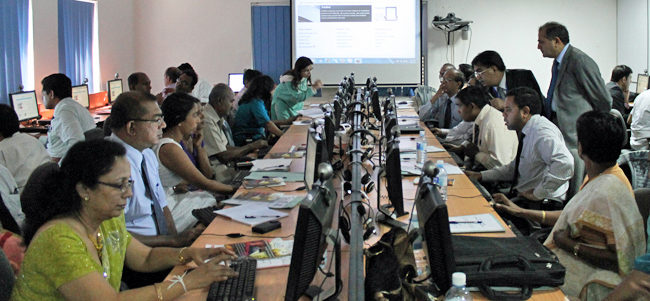South Asia research conference a big success

computer session - for more photos see photo gallery at end of article
The International Research Methodology Conference for Primary Care Physicians was arranged by the South Asian Primary Care Research Network (SAPCRN), WONCA and the College of General Practitioners of Sri Lanka. It was held on January 19–20, 2013 at the National Online Distance Education Services Center, the Open University of Sri Lanka, Nawala, Nugegoda and Colombo, Sri Lanka. The theme of the conference was Strengthening Primary Care Research through Family Doctors.
This event comprised a two days’ full-time, hands-on workshop covering all important topics of research methodology; along with research paper presentations and research proposal discussion before the panel of experts and speakers.
The opening ceremony started with a delectable Sri Lankan breakfast at 0800 hours on Saturday 19 January 2013. After traditional lighting of oil lamp by the chief guest, guest of honour and the faculty, the welcome address was from Dr Preethi Wijegoonewardene, WONCA South Asia Region President. Then Dr Basharat Ali, chairperson of SAPCRN, enlightened the audience on the importance of research in family care in South Asia. He expressed his views and suggested continuing these kinds of workshops in future. Dr Eugene Corea, President College of General Physicians Sri Lanka, expressed his views about the current status of research in Sri Lankan general practice and showed willingness to face the challenge of its promotion.
Research issues unique to each country were discussed in detail by Dr Ruvaiz Haniffa, from Sri Lanka; Professor Waris Qidwai, from Pakistan; and Dr Ramnik Parekh, from India. All the participants agreed to take the cause of research in general practice as a challenge in future. Chief guest Dr Palitha Maheepala, Director General Health Services Sri Lanka, addressed the audience about the current status of health services in regard to general practice and research in general practice. He offered his cooperation to promote these activities in future. At the end of opening ceremony guest of honor, Dr Palitha from WHO expressed his views on research in general practice and the way to promote it.
The scientific session was started at 1000 hours, by Dr Basharat Ali, with his presentation on Introduction to research; how to search for topic and formulate research questions. Then there was a hands-on workshop on literature searching and referencing. Every participant was provided with a computer and internet access to help them understand the roots of the sessions. This was a very interesting session and the participants showed their keen interest. All speakers helped the participants to find the articles of their interest and how to search for references. Dr Seema Bhanji, Chairperson of Pakistan Primary Care Research Network (PPCRN) presented an interactive session on Introduction to epidemiological study designs. Participation from the audience was marvelous and Dr Seema presented in an excellent way. Dr Seema also gave talk on how to use SPSS and working with statistics.
Professor Rohini Seneviratne team was marvelous in presenting the Introduction to biostatics and type of data. Professor Waris Qidwai talked about an important topic, Research Ethics and discussed the issue related to ethical problems in different type of studies. Dr Sajida Naseem performed an interactive session on different type of data and their implementation. She also talked about sample collection and way to design questions. The interest of the participants in all these sessions was remarkable.
Dr Noor Ahmad Akhtar presented, How to write manuscripts and the problems faced by the researcher while writing synopsis, research article and thesis and way to input references. There were four research papers presented in the conference by Dr Zain Noor, Dr Adnan Nazeer, Dr Sajida Naseesm and Dr Noor Ahmad Akhtar. There were six research proposals presented by Dr K Chandrasekher, Dr RDN Sumanasekera, Dr AHW De Silva, Dr Hiranthini De Silva, Dr Chandima Jeewandara and Dr Shreen Willanthgamuwa. All the research papers were appreciated well by the experts and the participants. The research proposals were discussed and guidance given by the experts to the presenter. There was a session of reflective process and a detailed session of discussion of the problems family physicians face in research. A primary care research network was made for the Sri Lankan family physicians with its collaboration to SAPCRN.
At the end, concluding remarks were given by presenters and the organisers with recitation of the national anthems of the participant countries. A seedback form was filled in by the participants. The performance of Dr Dinusha Perera as coordinator of the conference was excellent. The participation of Dr Jyoti Parekh, from India, was also memorable.
Research workshops of this kind are a new milestone in family medicine training. These activities should be held frequently in the entire South Asian region to promote research in primary care in South Asia.
Dr Basharat Ali
Chairperson SAPCRN